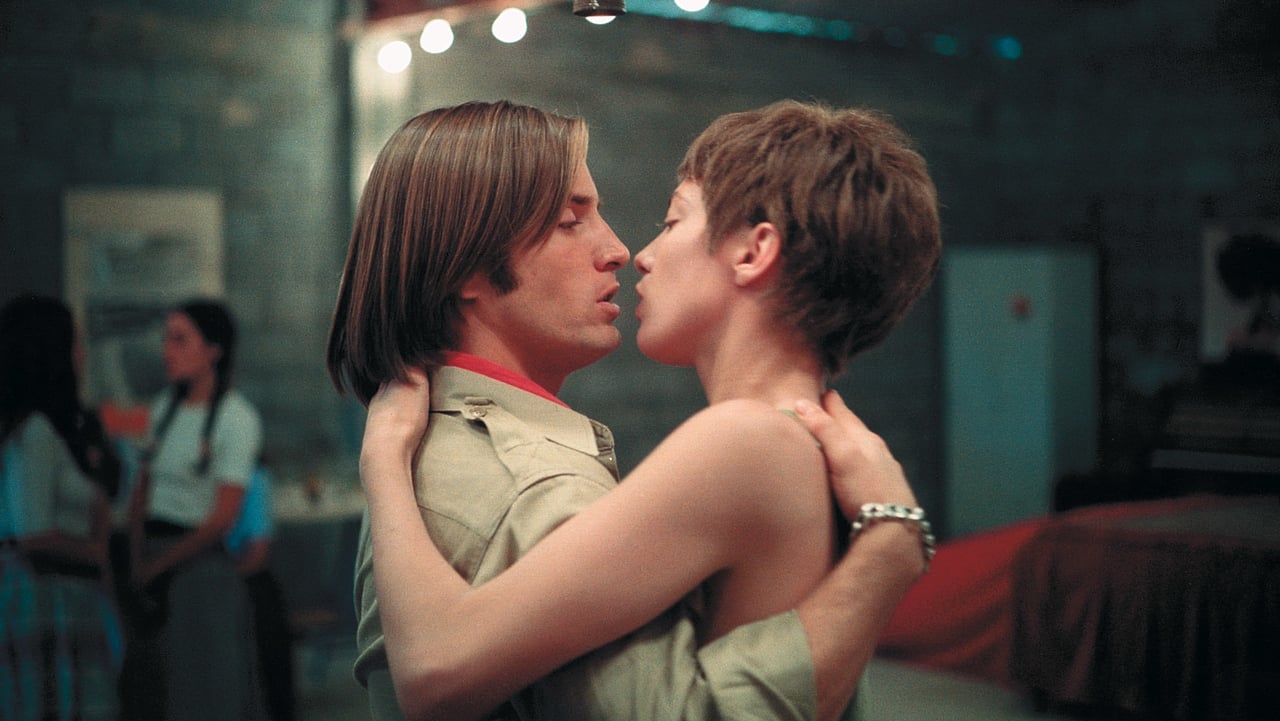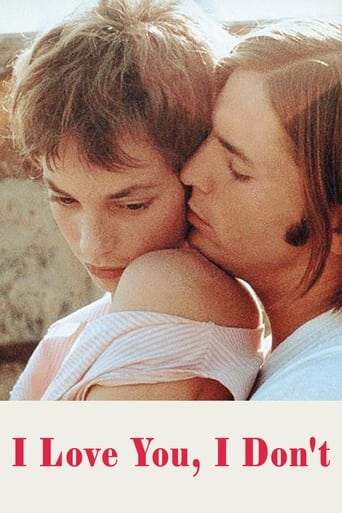

Not much of a story, like in "un homme, une femme"(also with a famous song in the film) , its real strength is the atmosphere it invokes, - the desolute landscape which accentuates the feeling of loneliness, the truculent male star, the hard stares from the judging locals, the weak and fragmented dialogue, the not too bright couple who were madly in love, it's just one of those films that you can't forget, and of course, very french in style, ....the scenes of anal sex were unnecessary, but the film was released in the 1970's so a bit of scandal , only helped to sell more the film to the public.I think a remake of this film in the US, could be done nowadays. Filmed in the plains of the Midwest, in some god forgotten village, it would be a hit, especially considering the amount of free publicity US films get !
... View MoreThis movie was so near to be ridiculous but there's a sense of measure and a limpid style that make not possible to be ridiculous. It's a love story and the fact is that is possible for love to get over the sexual difference? Krass and Padovan are two gays in crisis; Krass meets Johnny a female, androgen because she had no tits but a well rounded ass.You can think is the perfect woman for an homosexual. But there is more over the sexual attraction between the two; they starts to practice sodomy to made relationship like gay relationship but after there is more. All that it happens in a no man's land surely in the united states, the right place for no man's land.We are in the USA but we are everywhere;it is also true that we are only in the USA and the director made this possible with just a few of elements in this "no" place.That's related with the exquisite economy of the movie. For something is possible to relate this movie with "Last tango in Paris" because we have a relationship between two persons never met before in a neutral zone and the final is a little similar, there's a irremediable broke in the game. But i prefer this little film then the Bertolucci overrated movie
... View MoreI won't rate this movie, because it makes an impression despite being unimpressive on the whole. Often boring and disgusting, this movie can still stand to viewing given two academic crutches: its boringness supported by Brecht's warning that boring stories can be more thought provoking and its disgusting portrayals of sex held up by Paul De Man's proviso that disgust is a distraction from the larger picture.The dialog has some merit. As in My Life to Live or Alphaville or Pulp Fiction for that matter, moments where the film has made you feel most alienated from the characters usually foray into uncommon, abstract conversations. The answer to "Johnny" (Jane Birkin) when she tells her boyfriend, "I love you. Do you love me?" is not "I don't" but rather an unenthusiastic, somewhat incomplete "yes." He explains that the way their bodies move in rhythm together is all love is, and that it's rare.The scenes that will appeal to fans of French film are the ones where "Johnny" and her boyfriend are alone and where "Johnny" is not crying in agony. Her lover will utter something strange and surprising like that his work as a garbage man is important because moving things from one place to another is just like what happens to bodies after they die. Enthymemes, incomplete logical statements, abound in that character's statements. In this case, he does not establish the importance of transporting corpses. Later, he explains that sometimes he wishes he were crap, because he used to dream about coal-burning trains and they're electric now. He does not explain whether it's the look or the smell or the wastefulness of burning coal that appeals to him, and why the new technology thus devastates him. At the end of the film, he tells "Johnny" that he would not beat up his old boyfriend who had threatened her life, with less than an explanation: "You want me to make his face into hamburger meat? What would that do?" Indeed, his rejection of her demand leads to his devastating inaction and their climactic fight.Serge's choice of such an unappealing gay protagonist makes this film feel homophobic. The mental inadequacies of the character do not stop at frail logic. His attempts to fool himself that "Johnny" is a boy make him seem as delusional as Scottie in "Vertigo," when Scottie dresses up a hat shop clerk named Judy Barton as a dead woman named Madeleine. His tolerance for "Johnny's" pain during anal intercourse paints him as an introverted and apathetic jerk a la Humbert Humbert. His flight from an angry woman makes him seem like any other craven character in a romance.Characters and plot are not everything in a movie. The camera work is original and the songs are inspired, but FEW (just three songs!)! Why couldn't such a prolific musical mind at least work with leitmotifs within his three melodies? Some of the decay of Serge's ambition is e
... View MoreWe had hoped that Serge Gainsbourg's most well-known film would demonstrate his interesting - if a bit twisted - perspective and style. Unfortunately, by the time "Je t'aime moi non plus" was made, Serge had become an "old fart", to borrow a recurring line from the movie. Instead of the inventive, hip Serge of the 'sixties, pulling musical influences from around the globe and spicing them up with naughty references, he had become the jaded fatalist, using shock value out of habit rather than effect. It would also appear that he had been a bit too influenced by Godard's "Weekend" for his own good. Long tracking shots of the protagonist's truck passing aimlessly through a barren landscape littered with wrecked cars are employed at least four times. What this film and its actors really needed were a plot and some actual dialogue. Birkin, Dallesandro and the rest of the cast do credible jobs with what they've been given to work with, but their doomed love triangle is bog-standard 1950s melodrama, with a gay twist. Absolutely wasted here is Gerard Depardieu, who turns in an awkward and unconvincing cameo as a homosexual beastialist. Thankfully, Gainsbourg still had talent in him as a composer, and the film benefits from his soundtrack. I suspect he was not encouraged to attempt more directorial efforts, as after "Je t'aime..." he only did vanity films.
... View More